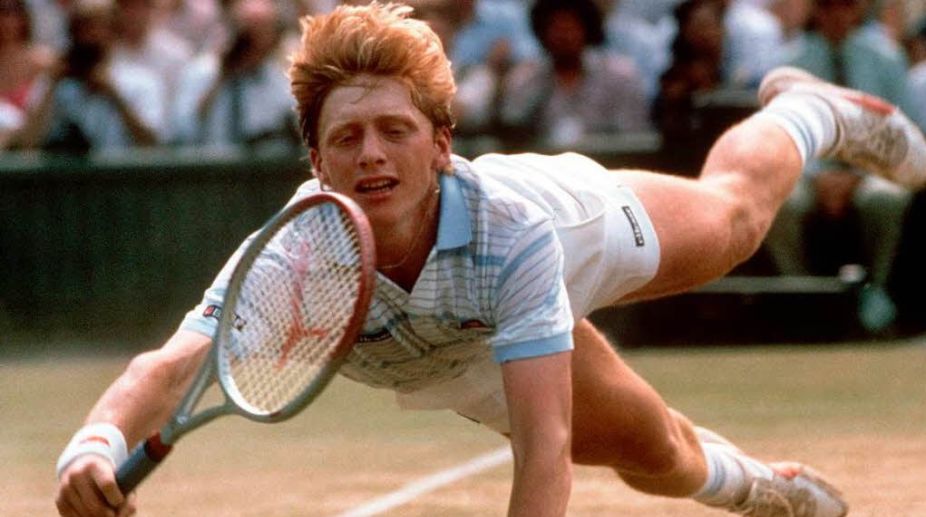Petra Kvitova announces tennis comeback after becoming a mother
Two-time Wimbledon champion Petra Kvitova announced her return to professional tennis following a 15-month break from the sport.

(File Photo: Twitter)
Boris Becker won six Grand Slams during a glittering career but even those treasured trophies are fair game as insolvency practitioners responsible for handling his bankruptcy try to track them down to pay his creditors.
The German took the tennis world by storm when as a red-headed 17-year-old he became the then youngest-ever men’s Grand Slam champion at Wimbledon in 1985, defending his trophy the following year.
Advertisement
Nicknamed “Boom Boom” Becker early in his career, he went on to win a further four majors and 49 singles titles in all, amassing 25 million in prize money and was selected to enter the International Tennis Hall of Fame in 2003.
Advertisement
But the 50-year-old’s business career has been less successful and last year he suffered the ignominy of being declared bankrupt by a London court.
Now, in an unusual twist, Becker is pleading for help to track down five missing Grand Slam trophies — including all three of his Wimbledon trophies — plus others, with the intention that they will be sold to pay his creditors.
Mark Ford, one of three insolvency practitioners at London-based Smith & Williamson, charged with collating Becker’s assets and selling them, told AFP that Becker’s case is complex, even after 20 years of dealing with corporate and personal insolvency.
“We are pursuing lines of inquiry into Germany, Switzerland, Spain, Guernsey, the United States, Australia — for the recovery of trophies and other assets — and Jersey.
That is genuinely demonstrative of an international bankruptcy.
“We have spoken to close to 20 former advisors to Mr. Becker and written to more than a dozen banks. There is plenty going on.”
– Trophy hunt –
===============
Becker, who enjoyed a successful spell from 2014 until 2016 as coach of former world number one Novak Djokovic, during which the Serbian won six Grand Slam titles, is under pressure to find the trophies even though he says he does not know where they are.
“Mr. Becker has, he claims, gifted only one trophy to his mother,” said Ford. “If he has gifted a trophy then that is something we would need to explore through discussion, and investigation, as that presents a difficult problem because there is no paperwork.
“All the trophies, medals and valuables will need to be given to me so that they can be sold to pay some money back to his creditors.”
“Typically these trophies are lent to institutions (the US Hall of Fame has several of Becker’s) — that is less tricky,” said Ford.
“There is no emotion in play… they understand they had the trophies on loan from Mr. Becker before he was bankrupt and that loan no longer applies.
“My role is different from the official receiver who upholds the public interest with respect to a bankrupt’s conduct. My role is to take a commercial view and realize the value of assets and sell them for the benefit of all of his creditors.”
Becker will have to tighten the purse strings but Ford admits his case is different from others.
“It is incumbent on me as a trustee in bankruptcy to analyze his income and expenditure,” said Ford.
“In this case, it is probably more complex than most others. The law is, if the bankrupt’s monthly surplus is more than 20 ( 28) it falls to me to agree with the bankrupt to pay the surplus as a trustee for benefit of creditors.
“Clearly, everyone would expect there to be a substantial surplus in this case. That applies to anyone be it a butcher or a baker if the surplus is more than 20.
“There is some commercial flexibility for me as a trustee because Mr. Becker has a different job to most of us and he needs to be out and about and be seen to bolster his personal brand. This should allow him to win work and generate a positive outcome for his creditors.
“I am having good discussions with Mr. Becker and his advisors about what his surplus genuinely is. This has been progressing relatively slowly as Mr. Becker has to be seen to maintain his contracts. However, there has to be a balance in all things.”
Advertisement